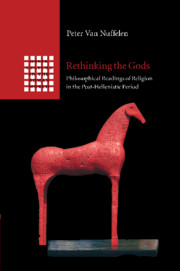Book contents
- Frontmatter
- Contents
- Acknowledgements
- Abbreviations
- Introduction
- Part I Ancient wisdom
- Chapter 1 Tracing the origins
- Chapter 2 Plutarch of Chaeronea
- Chapter 3 Numenius
- Chapter 4 Dio Chrysostom, Apuleius and the rhetoric of ancient wisdom
- Part II Cosmic hierarchy
- Part III Polemic and prejudice: challenging the discourse
- Bibliography
- Index
Chapter 3 - Numenius
Philosophy as a hidden mystery
from Part I - Ancient wisdom
Published online by Cambridge University Press: 05 December 2011
- Frontmatter
- Contents
- Acknowledgements
- Abbreviations
- Introduction
- Part I Ancient wisdom
- Chapter 1 Tracing the origins
- Chapter 2 Plutarch of Chaeronea
- Chapter 3 Numenius
- Chapter 4 Dio Chrysostom, Apuleius and the rhetoric of ancient wisdom
- Part II Cosmic hierarchy
- Part III Polemic and prejudice: challenging the discourse
- Bibliography
- Index
Summary
With Numenius, who is to be dated to the second half of the second century ad, we venture even further into the wasteland of fragments than we did when discussing Varro. A mere sixty fragments of his philosophical output have been collected by des Places for his edition. The dearth of material notwithstanding, Numenius is increasingly depicted as a central figure in later Platonism and cast as a source of inspiration for Plotinus and his followers on the one hand, and for early Christian theological speculation, in particular in the Origenist tradition, on the other. My interest here lies not with Numenius’ philosophical theories but with the sources he identified for his thought. Although the fragmentary state of Numenius’ œuvre renders all conclusions provisional and tentative, he seems to assume two parallel traditions of truth, that of philosophy and that of religion. Wilfully or accidentally, truth has become concealed in both traditions, and Numenius emphasises a thoroughly Platonist training as the precondition for rediscovering it. Although this chapter will necessarily be more speculative than the two preceding, it will provide important confirmation of the main characteristics of ancient wisdom that the preceding chapters have outlined.
In both traditions wise ancients and concealment play a key role, as they did in Varro and Plutarch. The philosophical tradition of truth stretches back to Pythagoras, Socrates and Plato, who, in Numenius’ view, all withheld the full truth from the untrained minds of their followers. Numenius can be taken to suggest that the full truth has not been perceived by any philosopher since Plato – that is, before himself. These philosophers are supposed to be in fundamental agreement with the wisdom found in all peoples of venerable age and, more particularly, in their religious traditions. It is likely that Numenius thought mystery cults to be particularly good places to look for that wisdom. Even though Numenius discovers traces of truth in an astonishingly wide range of places, ranging from Greek and Roman myth to the cult of Mithras, the truth is not everywhere preserved in an unadulterated way. Indeed, traditions do not remain static. Things can be added, for example by lawgivers who create religious festivals in accordance with truth. The logical counterpart is that untruthful additions creep in as well. Again, Platonism is needed to gauge the value of religion. Numenius spells out explicitly what is only implicit in Varro and Plutarch: the truth of religion is only to be accepted in as much as it agrees with what philosophy (in this case Plato) teaches. Although both traditions of truth are depicted as running parallel, philosophy provides the yardstick with which to judge religion. Even better: we need Numenius. Both his reading of the history of philosophy and his limitation of the truth of tradition to its agreement with Plato conspire to put Numenius forward as, in his view, the main authority for interpreting both the philosophical and the religious traditions. As such, he seems to put himself on a par with the great figures of the past.
- Type
- Chapter
- Information
- Rethinking the GodsPhilosophical Readings of Religion in the Post-Hellenistic Period, pp. 72 - 83Publisher: Cambridge University PressPrint publication year: 2011

